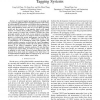Free Online Productivity Tools
i2Speak
i2Symbol
i2OCR
iTex2Img
iWeb2Print
iWeb2Shot
i2Type
iPdf2Split
iPdf2Merge
i2Bopomofo
i2Arabic
i2Style
i2Image
i2PDF
iLatex2Rtf
Sci2ools
178
click to vote
COLCOM
2009
IEEE
2009
IEEE
An analytical study of GWAP-based geospatial tagging systems
—Geospatial tagging (geotagging) is an emerging and very promising application that can help users find a wide variety of location-specific information, and facilitate the development of future location-based services. Conventional geotagging systems share some limitations, such as the use of a two-phase operating model and the tendency to tag popular objects with simple contexts. To address these problems, geotagging systems based on the concept of ‘Games with a Purpose’ (GWAP) have been developed recently. In this study, we use analysis to investigate these new systems. Based on our analysis results, we design three metrics to evaluate the system performance, and develop five task assignment algorithms for a GWAP-based system. Using a comprehensive set of simulations under both synthetic and realistic mobility scenarios, we find that the Least-ThroughputFirst Assignment algorithm (LTFA) is the most effective approach because it can achieve competitive system utility, while ...
Assignment Algorithm | COLCOM 2009 | Distributed And Parallel Computing | Future Location-based Services | Two-phase Operating Model |
Related Content
| Added | 21 Jul 2010 |
| Updated | 21 Jul 2010 |
| Type | Conference |
| Year | 2009 |
| Where | COLCOM |
| Authors | Ling-Jyh Chen, Yu-Song Syu, Bo-Chun Wang, Wang-Chien Lee |
Comments (0)

